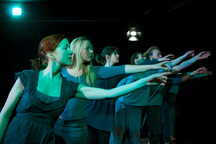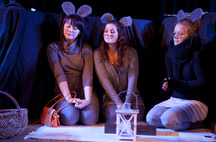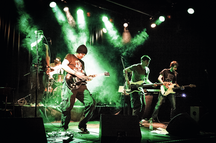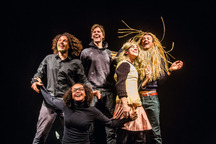Projects in the region
Research with regional ties
The Osnabrück University of Applied Sciences is internationally well networked and attaches great importance to facilitating cooperation across national borders in studies, teaching and research. At the same time, it is also in the nature of the university to be anchored firmly in the region. There are many close, interconnected links especially to the regional economy and society. For the core concern of the university, the offer of practice-oriented teaching and research is of great importance. As an example, we list several projects here that illustrate how the scientists of the university and the students get mutually involved with partners from their immediate vicinity.
The Osnabrück University of Applied Sciences sees itself in the role of a responsibility for the region. When it comes to the training of professionals, the advanced training of workers or innovations for local businesses, the university is a frequent point of contact.
As part of the internal research focus of NetFuture Lower Saxony of the Osnabrück University of Applied Sciences (website only available in German), scientists at the university locations of Osnabrück and Lingen examine strategies and measures jointly with their partners from business and politics to increase the acceptance of the transmission grid expansion in Lower Saxony. The network expansion is a necessary, central component of the energy revolution in Germany, and it concerns the State of Lower Saxony to a substantial extent.
The project (start September 2014) is funded by the State of Lower Saxony and the Volkswagen Foundation with approximately one million euros over a period of five years. A look at the list of the participants shows that NetFuture Lower Saxony is a good example, of how the University of Osnabrück is working shoulder to shoulder with many stakeholders from its environment for the sustainability of the region. Among other things, the Lower Saxony County Association, the German Association of Towns and Municipalities, the Lower Saxony Ministry of Economics, Labor, Transport as well as the transmission grid operators Tennet and Amprion are among those involved in the project.
The Weser Ems and the Osnabrück district are one of the most important impulse generators in the internationally oriented agricultural technology sector. Constant innovation is essential for companies and so they rely on close cooperation with the Osnabrück University of Applied Sciences, which benefits all sides.
Since 2007, the COALA network – Competence of applied agricultural engineering – bundles the competencies of the specialized areas at the university of applied sciences in order to promote agricultural engineering innovations. Researchers from the fields of agricultural sciences, electrical engineering, computer science and mechanical engineering contribute their skills.
The autonomous agricultural robot platform "BoniRob", among other things, emerged through the collaboration. It was developed by an interdisciplinary research team of the Osnabrück University of Applied Sciences together with the Amazonen Werke and Bosch resulting in the Bosch spin-off "Deepfield Robotics". Also a potato and corn app has been developed with COALA know-how. Here, the equipment drivers involved in the harvest are equipped with tablet computers and smartphones. Thus, they are always informed on the locations of all vehicles, the distances between them and the load on the loading areas, among other things. Workflows can be designed so much more efficiently.
Further information is available on the website of the COALA Competence Center.
Further information is available on the website of the COALA Competence Center (website only available in German).
About 500 young people studying at the Institute of Music (IfM) of the Osnabrück University of Applied Sciences In the seven studies profiles, Classical Instrumental, Classical Vocal, Pop, Jazz, Elementary Music Pedagogy (EMP), Composition, Music Theory, Aural Training (KMG) and Musical. Practical experience is always in the foreground. Prof. Sascha Wienhausen, the head of the IfM, stated in the 2013 annual report of the Osnabrück University of Applied Sciences: "If one were to evenly distribute the concerts and performances of the Institute of Music by its teachers and students in Osnabrück and the region in 2013 throughout the year, a public event would have taken place on average every day."
For example, musical students and instrumentalists of the IfM always contribute to productions of the Osnabrück Theater. Even at traditional events such as the "Maiwoche", "Summer in the City", the "Cultural Night" or "Summer in the Courts", appearances by members of the IfM belong to the program. And of course, numerous university productions enrich the stages of the region. With the JAZZ!Nights and the POP!Stage, the IfM has also established two musical events in Osnabrück which have met with great resonance.
The Burgtheater (website only available in German) in the heart of Lingen has a permanent place as part of the cultural scene. The theater of the Institute for Theater Pedagogy offers space for storytelling cafés, readings, guest performances, performances and above all the many projects of the students.
How can inclusion succeed, i.e. the enabling of participation for all people? In the internal research focus "Inclusive education - participation as an operational and organizational principle", a research team of the Osnabrück University of Applied Sciences has pursued exactly this question since September 2012. Specifically, the scientists take an interdisciplinary look at three inclusion places: first child daycare facilities, second schools and the school-related child and youth assistance and third vocational training and work.
Among other things, the idea of a study on the inclusion in kindergarten and elementary schools illustrates the strong network of the internal research focus with local and regional stakeholders. In the first half of the year 2014, the scientists in the region carried out a questionnaire. 112 directors and 1030 staff took part from the daycare centers in the city and district of Osnabrück. 54 school directors and 490 teachers participated from the schools.
For more information on the work of researchers, got to the website of the internal research focus "Inclusive education" (website only available in German).
The Osnabrück University of Applied Sciences is a partner in the "Project PInA". This involves setting up an information and planning portal to use industrial waste heat for the Bremen-Oldenburg metropolitan region in the northwest.
On the website for the project, it says: "Process heating such as that needed for drying, smelting or smithing in the production accounts for about 57 per cent of energy consumption in the commercial and industrial sector. And often much of the expensively generated energy is lost as waste heat via the ventilation system. In many industries, the potential of waste heat is so large that a reuse is not only worthwhile from an ecological but also economic point of view. The portal Industrielle Abwärme (PInA) [information portal of industrial waste heat] wants to visualize existing waste heat potentials. To this end, a mapping of the heat offers and the heat demand of the regional companies has been created and represented for the Osnabrück district in an online planning portal."
The project management is located in the District of Osnabrück, the Wirtschaftsförderungsgesellschaft Osnabrücker Land mbH [Business Development Corporation Osnabrück Region] WIGOS is also a collaborative partner. The research project is supported by the Bremen-Oldenburg metropolitan region in the northwest.
In the project "Village community 2.0" the "Gesundheitsregion [Health region] EUREGIO" association with more than 120 members has set the goal of preparing the County of Bentheim and southern Emsland with concrete steps for demographic changes. The focus is the improvement of the living conditions of older people through the use of innovations in human-technology interaction. Older citizens are to be helped in matters of everyday life and living. The project should help them live independently as long as possible in their familiar environment. The association is accompanied scientifically by the Osnabrück University Applied Sciences and the University of Osnabrück.
Four building blocks are planned in "Village 2.0": a cooperatively organized village shop which offers products for daily use; the ICT-based (ICT: Information and communication technology) setup of demand-oriented "e mobility concepts" for the village community; the "digitized care" a multi-professional, technology-driven approach to home care, and a "rolling practice", with which outreach telemedical healthcare is established. The basis is the "virtual village marketplace" where the services can be merged and used by all.




